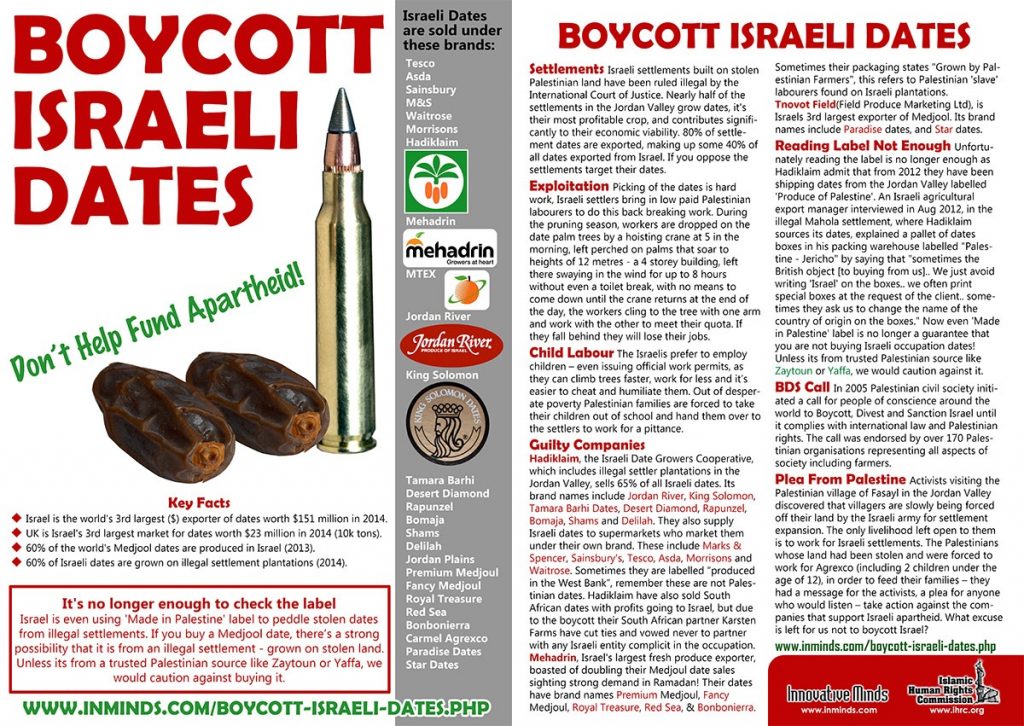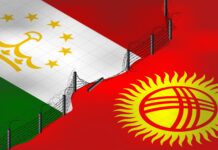The Islamic Human Rights Commission (IHRC) is urging Muslims to watch out for Israeli dates with misleading labels as part of its campaign to boycott Israeli dates this Ramadan.
IHRC chair Massoud Shadjareh has warned that it is no longer sufficient to simply check labels as the Israelis are attempting to deceive buyers by not labelling products properly, or by labelling them with Arabic writing or with “Made in Palestine” labels.
He said: “Don’t break your fast with stolen dates this Ramadan. What has been happening in the last few years is that because of efforts to boycott Israeli dates they are actually losing money so they are trying to deceive people.
“So make sure you look carefully at boxes of dates even if it has Arabic writing or the name of Palestine on it. If the box has no information about the name of the company or the importer, it is unlawful and fraudulent.
“Make sure your shop knows who the distributor is and make sure you complain to Trading Standards. Make sure you stop this abuse, make sure what you break your fast with is halal, ethical and supports the Palestinians.”
IHRC says that unless dates are from trusted Palestinian sources like Zaytoun or Yaffa, it would caution against buying them.
Date brands to avoid include:
Subscribe to our newsletter and stay updated on the latest news and updates from around the Muslim world!
- Jordan River
- King Solomon
- Tamara Barhi Dates
- Rapunzel
- Bomaja
- Desert Diamond
- Shams
- Delilah
Israeli companies also supply supermarkets which market dates under their own brand. These include Marks & Spencer, Sainsbury’s, Tesco, Asda, Morrisons and Waitrose. Sometimes they are labelled “produced in the West Bank,” but these are not Palestinian dates.
It is illegal to sell food products without the name/address of the importer/distributor and the correct country of origin. So IHRC is urging people to report offenders to local Trading Standards office.
Israeli settlements built on stolen Palestinian land have been ruled illegal by the International Court of Justice. The IHRC says 60% of Israel’s dates are grown in these settlements, and it is their most profitable crop contributing significantly to their economic viability. 80% of settlement dates are exported, the UK being Israel’s 2nd largest market.
Israeli settlers bring in low paid Palestinian labourers to do the back-breaking work of picking the dates. They prefer to employ children, according to the IHRC, as they can climb trees faster, work for less and it’s easier to cheat and humiliate them.
Out of desperate poverty Palestinian families are forced to take their children out of school and hand them over to the settlers to work for a pittance.
In 2005 Palestinian civil society initiated a call for people of conscience around the world to Boycott, Divest and Sanction Israel until it complies with international law and Palestinian rights. The call was endorsed by over 170 Palestinian organisations representing all sections of society, including farmers.
Israeli leader Binyamin Netanyahu has accused supporters of BDS of practising “antisemitism in a new garb,” said the international sanctions movement is intended to lead to “the end of the Jewish state.”






















